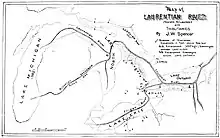Laurentian River System
The Southern Laurentian Channel is an ancient underground river in southern Ontario, Canada.[1][2][3][4] The river predates the recent ice ages.[5] The river valley was filled with glacial debris. Water still flows down this old valley—underground. The source of the aquifer is the Georgian Bay,[6] approximately 200 kilometres (120 mi) away.

In 2003 it was discovered that the southern section of the Laurentian aquifer reaches under High Park in Toronto, Ontario, Canada.[6] This is believed to be where the Laurentian River System drains into Lake Ontario. An overflow pipe is visible running into Spring Creek in High Park and is always at a steady flow. Its current purpose is to enrich local coldwater wildlife in the creek and relieve hydrostatic pressure. The area surrounding the outlet is stained red indicating a high iron content. The water flowing from it is naturally pure and cool, at around 6-9 degrees Celsius or 42-48 degrees Fahrenheit.
During the discovery of the Laurentian Channel, a well was drilled to investigate further. While it was being drilled, a massive burst of water, silt and gravel suddenly rocketed out of the well. Somehow, the Laurentian Channel's flow to Lake Ontario had been blocked, causing a huge pressure buildup.
The bedrock under Toronto has several dips believed to be carved by the Laurentian River.[7]
The Laurentian Channel, 25-30 km wide in some areas, 100 km long and greater than 100 m deep, still lacks data regarding its total size and sediments, relying on well sites for information. Sediments in the channel range from sands and gravels near the bottom and clay-like silts near the top.[8]
References
-
"CAMC/YPDT - High Park". 2006. Archived from the original on 2012-04-26. Retrieved 2011-11-29.
Based on this, as well as on previous gravity work completed by the University of Waterloo (Gill and Karrow, 1996) it was suspected that one of the main outlets of the Laurentian River, a significant pre-glacial bedrock valley, was located in the vicinity of High Park.
-
"Ancient River Found Flowing Beneath Toronto". Reuters. 2003-09-19. Archived from the original on 2012-02-22. Retrieved 2011-11-29.
There's an ice-age river flowing deep under Canada's largest city. There has been for at least a million years but it wasn't until last month that anyone saw any real evidence of it.
-
"Before the Ice Age". Lost Rivers. 2003. Retrieved 2011-11-29.
The river that drained this area, the Laurentian River, flowed through the Toronto area. It had started from Lake Superior and flowed through the Lake Huron Basin, the Georgian Bay Basin and, through a valley in bedrock, now hidden by the Oak Ridges Moraine, to the Lake Ontario Basin and thence by the St. Lawrence Valley to the Ocean.
-
"Discover the natural wonders of Toronto's High Park". High Park Nature. 2011-04-26. Retrieved 2011-11-29.
The drilling had gone down about 40 metres when a mixture of shale, gravel, sand and water exploded 15 metres up into the air. The drill had tapped into an ancient underground river! Called the Laurentian River, it is an artesian aquifer thought to be flowing very slowly from Georgian Bay through a layer of sand and gravel just above bedrock level.
-
"Oak Ridges Moraine". York, Peel, Durham, Toronto and The Conservation Authorities Moraine Coalition. 2014-08-04. Retrieved 2016-02-04.
Since first proposed by Spencer in 1881, the Laurentian River system has been noted and delineated by different Ontario geoscientists (e.g. White and Karrow, 1971, Brennand et al, 1998). In this part of south-central Ontario, the Laurentian River - believed to have been a main drainage pathway for a significant portion of the Great Lakes Basin - flowed from the Wasaga Beach area at Georgian Bay southwards through Simcoe County and York Region to Toronto where it has been traced into the Lake Ontario basin.
- Reeves, Wayne; Palassio, Christina (2007). HTO: Toronto's Water from Lake Iroquois to Lost Rivers to Low-flow Toilets. Toronto: Coach House Press. pp. 284–285. ISBN 978-1-55245-208-0.
- "Quaternary Geology: Toronto and Surrounding Area" (PDF). Ontario Geological Survey. 1980.
- Davies, Holysh, Sharpe (2008). "Groundwater Resources Study 9". Ontario Geological Survey.
{{cite journal}}: CS1 maint: multiple names: authors list (link)